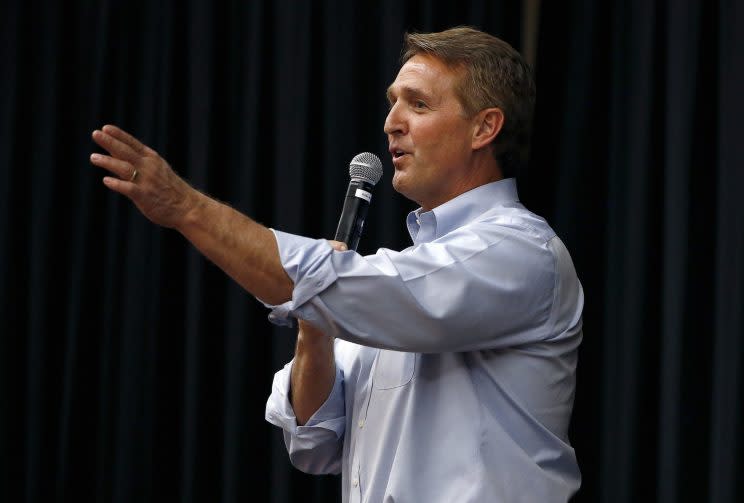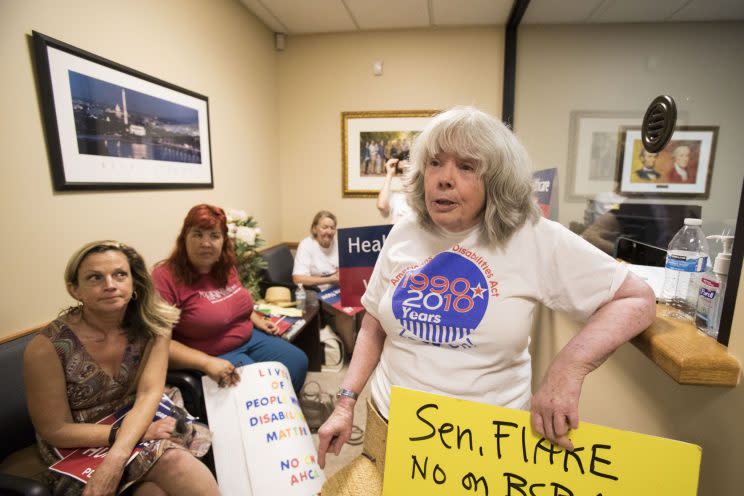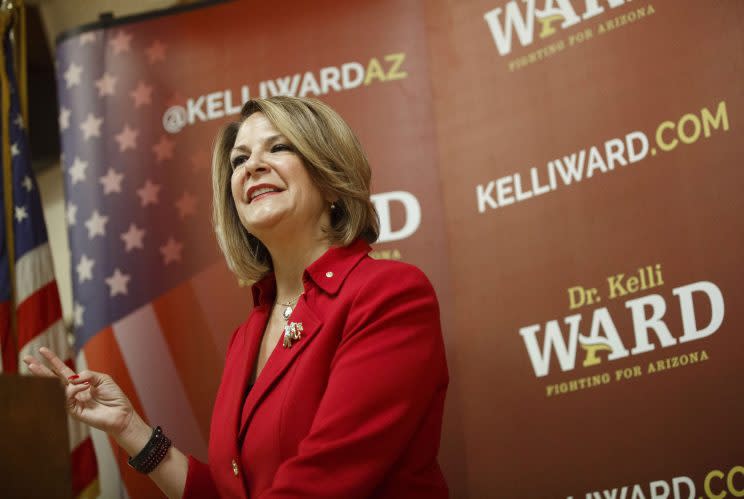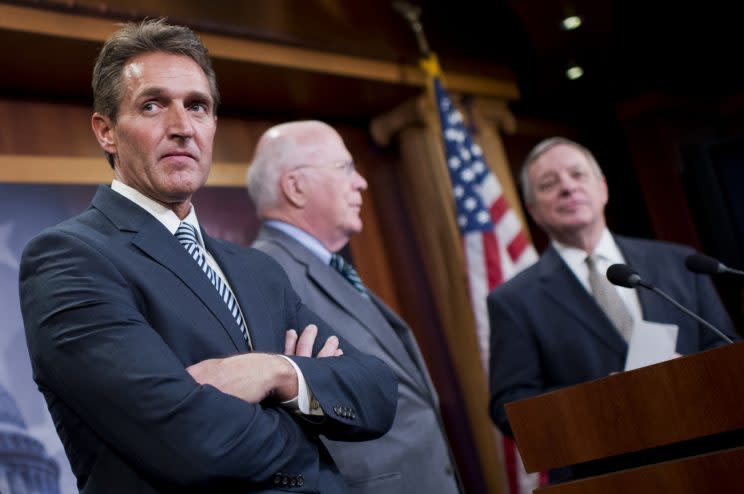Arizona is asking: Where does Jeff Flake stand on health care?

As the GOP continues to struggle to pass some sort of Obamacare repeal bill, there is no Republican senator in a tougher bind than Jeff Flake — and there has been no clearer illustration of how tough that bind has become than what’s been happening back in his home state of Arizona during Congress’s July 4 recess.
Ever since the House GOP unveiled its American Health Care Act earlier this year, Flake — one of only two swing-state Republican senators up for reelection in 2018 — has remained noncommittal, repeatedly declining to say whether he would vote for any of the various proposals on the table.
Now Arizonans on both sides of the aisle are demanding an answer.
On Wednesday, roughly 20 progressive activists, many with physical disabilities, flooded into Flake’s Phoenix office as part of a nationwide protest organized by the disability-rights group ADAPT. They installed a cardboard coffin in the lobby, with a headstone reading “Cuts to Medicaid = Death.” They waved signs that said “Don’t Kill 22 million + Americans.” They chanted about “free[ing] our people” and “find[ing] Jeff Flake.” They stayed for 14 straight hours. Five were cited by police for trespassing.
“I just want to know — a simple yes or no would suffice for me — his position,” said Demeris Herrera of Tucson.
(Two unaffiliated protesters were arrested Thursday morning outside Flake’s office in downtown Tucson, including one who allegedly threatened a staffer.)
Meanwhile, Flake’s far-right, pro-Donald-Trump GOP primary opponent, Kelli Ward, made the same point in an interview with Yahoo News, insisting that after “years of campaigning and raising money on fully repealing Obamacare,” Flake is instead “giving sanctuary to Obamacare because he is unwilling to speak up and take a stand.”

“He’s too weak to lead right now,” Ward charged.
As for Flake himself? According to his spokesman, the senator spent most of the week in Utah mourning his father, who died on June 26. Flake’s only response to the ongoing health care debate was a statement (released to both Yahoo News and the protesters in his office) that consisted mainly of recycled talking points.
“While I have not yet seen a revised version of the bill I can say my decision will be based on how it balances two principles,” it said. (Flake declined to be interviewed for this story.) “The first is that the legislation needs to ensure that those who currently have coverage do not have the rug pulled out from under them. The second is that the Senate must agree on a solution that is fiscally sustainable.”
The fact that Flake is staying silent on the Senate repeal bill — and catching flak from both the left and the right as a result — neatly encapsulates the unique political challenge he’s facing in the runup to the 2018 midterms.
At first, the GOP’s other vulnerable swing-state senator, Dean Heller of Nevada, tried to avoid the subject as well. But soon after Senate Republicans released their version of the House repeal bill late last month, Heller came out against it, announcing that he “cannot support a piece of legislation that takes insurance away from tens of millions of Americans.”
Heller’s break with GOP brass reflected basic electoral math: Given recent trends in Nevada, the greatest threat to his reelection effort is more likely to come from a Democrat than a Republican. To wit: Nevada freshman Rep. Jacky Rosen announced Thursday that she would be running against Heller in 2018, and Rep. Dina Titus, a long-serving Democrat, has also signaled her interest in the race. So far, Heller has yet to draw a GOP primary opponent.
Flake, on the other hand, is being squeezed from both sides. Already Ward is attacking him from the right, while Deedra Abboud, a Phoenix attorney and community activist, is angling for the Democratic nod. They probably won’t have the field all to themselves. Arizona State Treasurer Jeff DeWit, a Republican who is close to President Trump, is said to be eyeing a bid, as are two top Democrats, Rep. Kyrsten Sinema and Phoenix Mayor Greg Stanton.

“I don’t predict the future,” Sinema told Yahoo News when asked whether she might challenge Flake. “I’m currently running for reelection [to the House]. That’s my current status.”
Hence Flake’s hemming and hawing: His strategists have likely concluded that there’s little benefit to weighing in on the Senate repeal bill — and angering one side or the other — until it actually comes up for a vote (which may never happen).
And that calculation has, in turn, raised an even bigger question about politics in the age of Trump.
With the GOP in ideological disarray and polarization at an all-time high, can a conservative Republican who prides himself on his independence — from both the president and party orthodoxy — still cobble together a winning coalition in a swing state like Arizona? Or is he just going to make everybody angrier?
Two years ago, I spent a day with Flake in the back of an aide’s rented Ford Explorer, driving across Arizona from event to event. It seemed then, as it seems now, that Flake’s betwixt-and-betweenness — his reluctance to conform to political expectations — is just the way he is. As a young congressman, Flake tried to tame his own party’s extravagant Bush-era spending, regularly shaming earmark sponsors on the floor of the House. In 2013, as a senator, he joined the bipartisan Gang of Eight to craft a comprehensive immigration reform bill that included a pathway to citizenship for illegal immigrants. In 2015, he was the only Republican who accompanied then-Secretary of State John Kerry to Cuba to preside over the reopening of the U.S. Embassy after a 54-year diplomatic freeze. He advised his fellow Republicans to back down on same-sex marriage, regardless of their personal views, and voted to ban discrimination on the basis of sexual orientation and to repeal “don’t ask, don’t tell.” During the 2016 campaign, he famously refused to endorse or vote for Trump, and he has continued to criticize the president for the last six months.
“Jeff is as straight a shooter as there exists in this place,” Democratic Sen. Chris Murphy once said of Flake. “I don’t know where Jeff will end up, but I know it will be because he’s made a decision on the merits, not the politics.”
Refusing to follow the partisan script has never made Flake especially popular at home. He barely edged out his Democratic Senate opponent Richard Carmona in 2012, and after revoking his support for a gun background-check bill the following year, Flake briefly held the lowest approval rating of any senator in the country. Even today, Flake ranks as one of America’s six or seven least popular senators (among their constituents).

Back in 2015, Flake insisted that his flagging poll numbers would not affect his politics. “That’s the beauty of being the Senate,” he joked in Tucson. “Six years between elections.”
But pretty soon, those six years will be up — and more than any other issue, health care may determine whether Flake gets to spend another six years in Washington.
The irony is that in Arizona, there isn’t as much partisan disagreement about Obamacare as there is nationally (or even in most other states). There are two reasons for this. The first is that last year most insurers fled Arizona’s Obamacare exchanges, leaving virtually all enrollees with only a single choice of carrier; at the same time, premiums for some plans increased by 116 percent, the highest rate hike in the country. As Tom Snook, a Phoenix-based actuary for consultants Milliman Inc., told the Wall Street Journal in October, “The Arizona market is the poster child for the problems the exchanges are experiencing nationally.”
The second reason is that Obamacare’s Medicaid expansion has helped more than 400,000 high-need Arizonans get health insurance — and it has been Republicans who have implemented and perpetuated that expansion. During the Great Recession, former Gov. Jan Brewer, a staunch conservative and early Trump supporter, cut the state’s Medicaid funding and froze enrollment; between 2011 and 2013, 150,000 adult Arizonans on Medicaid— nearly two-thirds of the childless adults in the program — lost their coverage.
But eventually Brewer had a change of heart, and she fought tooth and nail to push Obamacare’s Medicaid expansion through the legislature, telling her fellow Republicans, “You have to look at the reality. You have to do the math. [And] it’s not only a mathematical issue … it’s a moral issue.” Brewer’s Republican successor, Gov. Doug Ducey, has since come out against the Senate repeal bill in part because, by slashing federal funding for the Medicaid expansion, it will prevent Arizona from “pay[ing] for the real-world costs of providing care.”
As a result, Arizona politicians in less precarious positions than Flake actually sound somewhat alike when it comes to Obamacare — regardless of which party they belong to.
“It’s no secret that Arizonans have been frustrated with Obamacare over the last seven years, because the law has real problems,” Rep. Sinema, the Democratic congresswoman from Maricopa County, tells Yahoo News. “But parts of the law — like the Medicaid expansion — are still very, very popular. So the message I’m getting in Arizona is, ‘We didn’t love Obamacare, but the GOP plan is bad.’”
“A lot of us — both Republicans and Democrats in the House and Senate — want to find a bipartisan solution,” Sinema adds. “The problem is that none of us are in the leadership.”

At a contentious two-and-a-half-hour Mesa town hall in April — his only such event of the year — Flake could have said something similar. Again and again, his constituents asked about Obamacare.
“Will you commit to vote against any plan that does not cover essential benefits, women’s health, preexisting conditions, hospitalization and medication?” asked a woman suffering from autoimmune kidney failure.
“How are we going to work together across the aisle to insure these children and adults have coverage?” asked the mother of a girl with autism. “We cannot afford to let Obamacare implode, because without Obamacare my daughter would not be able to speak.”
“I do not understand how you can allow 24 million Americans go through life without affordable health care,” said a military veteran.
But again and again, Flake dodged the question.
“Obamacare is not sustainable in its current form,” he said in several different ways. “It needs to be changed. It needs to be reformed. That’s what we’re trying to do.”
Someday soon, Flake may have to get more specific. If and when that day comes, perhaps he can explain his long-held concerns about the growth of entitlement programs. Perhaps he can propose a fiscally conservative way to address those concerns without “pulling the rug out from under” the nearly 2 million Arizonans who get their health care coverage through Medicaid. Perhaps he can even push for the sort of bipartisan fixes he has championed on immigration.
Right now, however, the politics of the moment seem hostile to that kind of clarity. The question for Flake is whether he can survive the current storm with his reputation as a straight shooter intact — or whether, by waiting to weigh in, he’ll wind up looking like the very thing he has always insisted he isn’t: another typical politician.
_____
Read more from Yahoo News:
Violent protests break out at G-20 summit in Hamburg, Germany
Alaskans may hold key to health care bill, and they have … issues
GOP’s Cornyn defends Americans’ freedom to skip health insurance
Kentucky secretary of state emerges as most quotable opponent of Trump voter fraud panel
Photos: Trump visits Europe for G-20 summit on 2nd overseas trip


